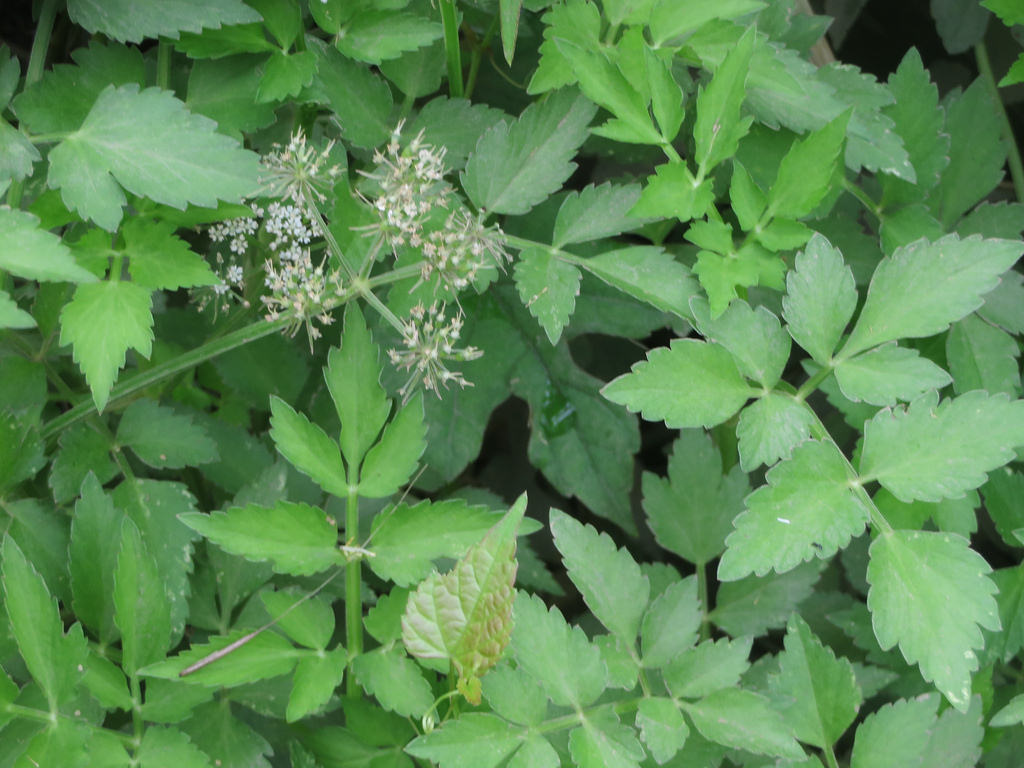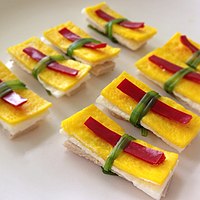Map Snapshot


3 Records
Status
Water Celery is an invasive species in Maryland (MISC 2022).
Seasonality Snapshot
Source: Wikipedia
| Oenanthe javanica | |
|---|---|

| |
| Scientific classification | |
| Kingdom: | Plantae |
| Clade: | Tracheophytes |
| Clade: | Angiosperms |
| Clade: | Eudicots |
| Clade: | Asterids |
| Order: | Apiales |
| Family: | Apiaceae |
| Genus: | Oenanthe |
| Species: | O. javanica
|
| Binomial name | |
| Oenanthe javanica | |
| Synonyms[2] | |
| |
Oenanthe javanica, commonly Java waterdropwort,[3] water celery,[4] water dropwort,[5] Chinese celery,[4] Indian pennywort,[6] minari and Japanese (flat leaf) parsley,[4] is a plant of the genus Oenanthe originating from East Asia. It has a widespread native distribution in temperate Asia and tropical Asia, and is also native to Queensland, Australia.[6]
This plant should not be confused with the plants of the genus Cryptotaenia, sometimes called "Japanese wild parsley" (mitsuba in Japanese), Apium graveolens var. secalinum which is also called "Chinese celery", or other plants called "water dropwort" and "water celery".
Description
[edit]Oenanthe javanica is a perennial herb that grows to about 1 m in height, with fibrous roots that emerge from all nodes, and flowers with 5 white petals and 5 stamens. The leaves are aromatic, glabrous, and have a sheath covering the stem. The leaflets are divided into lobes and crinkled.[7] The 'Flamingo' variety has colorful pink edges. The plant grows wild in moist areas, along streams and on the edges of ponds.[citation needed]
The plant is considered officially invasive in several states of the United States.[8]
Culinary use
[edit]While many other species of Oenanthe are extremely toxic, Oenanthe javanica is edible, and is cultivated in China, India, Japan, Korea, Indonesia, Malaysia, Thailand, Taiwan, and Vietnam, as well as in Italy, where its spring growths are relished as a vegetable.[citation needed]
India
[edit]Known locally as komprek (Meitei: ꯀꯣꯝꯄ꯭ꯔꯦꯛ[9]), it is commonly consumed in the Northeast Indian state of Manipur, where it is one of the main ingredients in Manipuri eromba and singju.[citation needed]
Japan
[edit]Called seri (セリ) in Japanese, it is one of the ingredients of the symbolic dish, Nanakusa Gayu, consumed on 7 January.
-
Nanakusa-gayu (seven herb congee) eaten on Nanakusa-no-sekku (seven herb festival)
Korea
[edit]In Korea, the plant is called minari (미나리) and is eaten as namul vegetable.[10] The 2020 drama film Minari is named after the vegetable.[11]
-
Minari-muchim (seasoned water dropwort salad)
-
Minari-oi-muchim (seasoned water dropwart and cucumber salad)
-
Minari-buchimgae (water dropwort pancake)
-
Minari-ganghoe (water dropwort rolls)
Constituents
[edit]The plant contains persicarin and isorhamnetin.[12]
See also
[edit]References
[edit]- ^ Zhuang, X.; Lansdown, R.V. (2011). "Oenanthe javanica". IUCN Red List of Threatened Species. 2011: e.T168749A6532868. doi:10.2305/IUCN.UK.2011-2.RLTS.T168749A6532868.en. Retrieved 19 November 2021.
- ^ The Plant List: A Working List of All Plant Species, retrieved 12 May 2016
- ^ NRCS. "Oenanthe javanica". PLANTS Database. United States Department of Agriculture (USDA). Retrieved 21 July 2015.
- ^ a b c Java waterdropwort/Oenanthe javanica - Wisconsin DNR, archived from the original on 2019-08-01, retrieved August 1, 2019
- ^ Arthur O. Tucker and Thomas DeBaggio. The Encyclopedia of Herbs: A Comprehensive Reference to Herbs of Flavor and Fragrance. Timber Press, 2009. p. 353. ISBN 9781604691344
- ^ a b "Oenanthe javanica". Germplasm Resources Information Network. Agricultural Research Service, United States Department of Agriculture. Retrieved 16 September 2022.
- ^ Tanaka, Yoshitaka; Van Ke, Nguyen (2007). Edible Wild Plants of Vietnam: The Bountiful Garden. Thailand: Orchid Press. p. 26. ISBN 978-9745240896.
- ^ Java waterdropwort at Invasive.org. Retrieved 25 October 2021.
- ^ Oenanthe javanica" at eFlora of India. Retrieved 25 October 2021.
- ^ Journal of Plant Biology - Volumes 45-46 2002- Page 83 "The cultivated type, 'Minari', is a major vegetable crop . These two types are not easily distinguishable; even quantitative characters such as leaf and petiole size cannot be used as criteria for their classification . "
- ^ Lee, Paula Young (2021-02-18). "In Minari, Yuh-Jung Youn Shows Us America Through the Eyes of a Korean Elder". Center for Asian American Media. Retrieved 2021-04-01.
...the minari plant, the herb after which the film is named.
- ^ Anticoagulant activities of persicarin and isorhamnetin. Ku SK, Kim TH and Bae JS, Vascul Pharmacol., April 2013, volume 58, issue 4, pages 272-279, doi:10.1016/j.vph.2013.01.005
External links
[edit] Data related to Oenanthe javanica at Wikispecies
Data related to Oenanthe javanica at Wikispecies Media related to Oenanthe javanica at Wikimedia Commons
Media related to Oenanthe javanica at Wikimedia Commons







